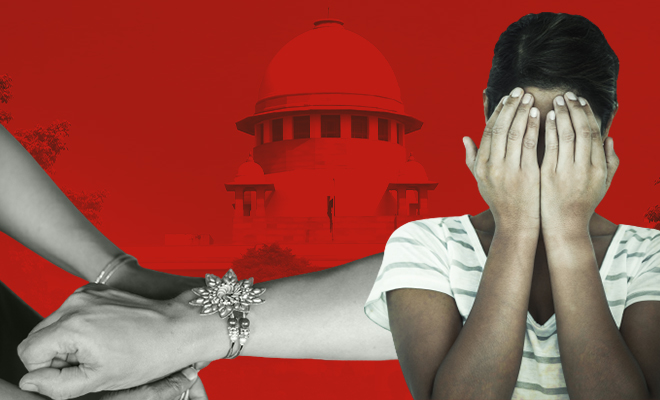Supreme Court Lays Out Directions For Lower Courts, Says Don’t Stereotype Women.

We live in an infuriating world. And I say this after coming across several nonsensical comments, rulings and judgements which yes, shakes our faith in humanity but also in the courts of law in the country. Especially when it passes judgments wherein if the perpetrator agrees to marry the woman he raped, or get a rakhi tied to himself by the victim, he is eligible to get out on bail. A decision recently made by the Madhya Pradesh High Court, that was contested by the Supreme Court and for all the right reasons.
Setting aside a judgement passed by the Madhya Pradesh high court where it asked a man who was accused of sexual assault, to get a “rakhi” tied on his wrist by the victim as a prerequisite condition of bail, the Supreme Court reinstated some guidelines that need to be kept in mind while granting bail in sexual assault cases.
Because, no matter how stereotypical our society may be, requesting the victim to tie a rakhi to a perpetrator to grant him a bail is undermining the seriousness of the crime committed, not to forget, implying that the interest of the accused is kept over and above the interest of the victim. To ask a sexual assault victim to tie a rakhi to her molester would mean her making a brother out of someone who violated her body, and that is just simply unacceptable.
#SupremeCourt junked an order from Madhya Pradesh High Court requiring sexual harassment accused to get a 'Rakhi' tied on his wrist by the victim as a condition for bail.https://t.co/41zFV9nXSG
— Mirror Now (@MirrorNow) March 19, 2021
Also Read : Delhi High Court Grants Bail To Rape Accused Because The Victim Has His Name Tattooed On Her Arm. So Consent Doesn’t Matter?
The bench that comprised Justices AM Khanwilkar and Ravindra Bhat issued seven directions in the matter that went as follows :
– Bail conditions should not mandate, require or permit contact between the accused and the victim. Such conditions should seek to protect the complainant from any further harassment by the accused;
– Where circumstances exist for the court to believe that there might be a potential threat of harassment of the victim, or upon apprehension expressed, after calling for reports from the police, the nature of protection shall be separately considered and appropriate order made, in addition to a direction to the accused not to make any contact with the victim.
– In all cases where bail is granted, the complainant should immediately be informed that the accused has been granted bail and copy of the bail order made over to him/her within two days
– Bail conditions and orders should avoid reflecting stereotypical or patriarchal notions about women and their place in society, and must strictly be in accordance with the requirements of the CrPC. In other words, discussion about the dress, behavior, or past “conduct” or “morals” of the prosecutrix, should not enter the verdict granting bail
– The courts while adjudicating cases involving gender-related crimes, should not suggest or entertain any notions (or encourage any steps) towards compromises between the prosecutrix and the accused to get married, suggest or mandate mediation between the accused and the survivor, or any form of compromise as it is beyond their powers and jurisdiction
It is good to see when #SupremeCourt pushes for gender sensitisation training of judges. Rakhi for Bail kinda orders are just unacceptable. https://t.co/JjUaXcjmJy
— Tanvi Shukla (@tanvishukla) March 19, 2021
The Supreme Court told the country’s courts not to comment on the conduct or character of victims of alleged sexual violence, nor to condone or dilute such offences by mandating mediation or marriage or setting trivial bail conditions such as apologies, rakhi-tying or gifts. https://t.co/aMSKcleytd
— Radha Kapoor Sharma (@radhakaps) March 19, 2021
– Sensitivity should be displayed at all times by judges, who should ensure that there is no traumatization of the prosecutrix, during the proceedings, or anything said during the arguments
– Judges especially should not use any words, spoken or written, that would undermine or shake the confidence of the survivor in the fairness or impartiality of the court.
Further to this, the court also observed that lower courts must “desist from expressing any stereotype opinion such as women are physically weak, should be submissive and obedient, good women are sexually chaste, among others.” After all, it is the men who need to be schooled on what not to do to be better human beings in the first place.
In a plea to Supreme court, advocate Aparna had contended that “such judgments from High Courts would end up trivializing such heinous offence and that there is a strong likelihood that such observations and directions may result in normalizing what is essentially a crime and has been recognised to be so by the law”.
The Supreme Court further to this also made some string observations against courts and judges expressing any stereotype opinions while writing judgments/ orders or hearing cases. They laid down 12 aspects which judges should compulsorily avoid in their judgments/ remarks during court hearings:
(i) women are physically weak and need protection;
(ii) women are incapable of or cannot take decisions on their own;
(iii) men are the “head” of the household and should take all the decisions relating to family;
(iv) women should be submissive and obedient according to our culture;
(v) “good” women are sexually chaste;
(vi) motherhood is the duty and role of every woman, and assumptions to the effect that she wants to be a mother;
(vii) women should be the ones in charge of their children, their upbringing and care;
(viii) being alone at night or wearing certain clothes make women responsible for being attacked;
(ix) a woman consuming alcohol, smoking, etc. may justify unwelcome advances by men or “has asked for it”;
(x) women are emotional and often overreact or dramatize events, hence it is necessary to corroborate their testimony;
(xi) testimonial evidence provided by women who are sexually active may be suspected when assessing “consent” in sexual offence cases; and
(xii) lack of evidence of physical harm in sexual offence case leads to an inference of consent by the woman.
The petitioners also alleged that such an order amounted to trivialisation of sexual offences by courts, and the bail condition further victimized the complainant and trivialised the trauma that she suffered. The fact that Supreme Court took into consideration the trauma and the gravity of the crime here, to set aside the MP High Court’s ruling, is a step in the right direction.

















